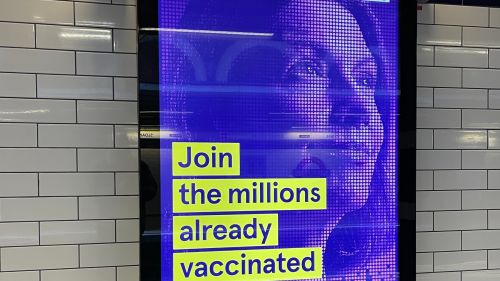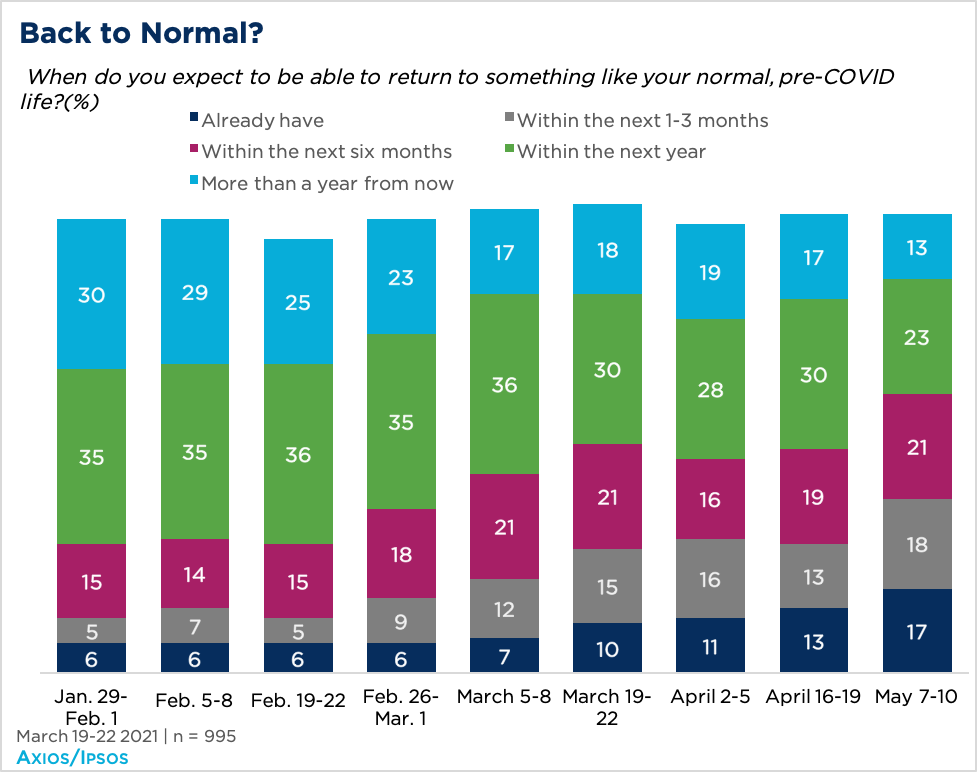As Virus Rages Unevenly, Global Public Opinion Shows Divergent Attitudes

Although cases have declined significantly in Europe, the United States, and much of East Asia, the pandemic remains a major threat in South America, India, and several other nations around the world.
This week the world passed the 160.4 million case mark, with over 3.3 million deaths attributed to COVID-19. While concerns about contracting COVID have seen a decline in several Western nations, the risk remains high elsewhere. Moreover, the uneven distribution of vaccines, as well as vaccine hesitation, is revealing that mass vaccination is an imperfect method for conquering the pandemic.
For this week’s COVID-19 update, the Chicago Council Survey team looks at polling results from the United States, Japan, South Korea, France, and the United Kingdom.
Key Findings
- For the first time since the pandemic began, a majority of Americans (56%) expect to return to normal life within the next six months—or sooner.
- Though seven in ten Japanese (72%) support the latest state of emergency extension, nearly as many (68%) also report feeling a sense of ‘self-restraint fatigue’.
- In South Korea, 97 percent report following the rules that limit get togethers to five people or less but just 59 percent think others do the same.
- As fears from the coronavirus decline in France, more general feelings of insecurity are rising with six in ten French people (61%) saying they feel unsafe.
- The United Kingdom is beginning to reopen as case and death numbers fall to a low point, and a majority of Britons (54%) say the government’s restrictions are about right at this point.
The United States
32.8 million cases, 583,210 deaths
The US vaccine rollout looks to have peaked in mid-April at nearly 3.9 million doses a day. Now, the US is focused on expanding vaccination coverage, both to underserved populations and to younger Americans.
It’s easy to understand why daily vaccinations are starting to fall when looking at the polling data: the large number of Americans who wanted a vaccine right away have, for the most part, gotten vaccines. Now, with vaccine supply exceeding vaccine demand, the task for public health officials turns to getting the remaining portions of the population vaccinated. One encouraging sign: polls such as the KFF Vaccine Monitor and Economist/YouGov polling both find that a rising share of Republicans say they want to get vaccinated. KFF polling from April finds that a majority of Republicans (55%) say they have either already gotten a shot or intend to do so as soon as possible, up from 46 percent in March, and only two in ten (20%) say they will definitely not get vaccinated.
Rising vaccination rates across the country are helping to bring normal life a bit closer every day. And Axios/Ipsos polling from May 7-10 finds that for the first time, a majority of Americans (56%) expect to return to normal life within the next six months—or sooner.

Not only is normality close at hand—it seems less risky than it has in a long time. For the first time in the Axios/Ipsos coronavirus index polling, a majority of Americans (57%) say that returning to their normal, pre-coronavirus life represents either a small risk (40%) or no risk at all (18%). And that’s because Americans are also seeing less risk in those normal, day-to-day activities that were hallmarks of pre-pandemic life. For the first time since the pandemic began, a majority of Americans see attending in-person gatherings of friends and family outside their household as a small risk (39%) or no risk (17%). By comparison, in early January most Americans saw doing so as a large (43%) or moderate (32%) risk to their health and well-being. Similarly, Americans see less risk in dining at a restaurant: most see it as a small risk (41%) or none at all (16%).
Japan
660,300 cases, 11,148 deaths
Despite successive states of emergency, Japan continues to struggle with hundreds of new cases each day. And while vaccines are now being rolled out, it has been a slow and frustrating process. All of these factors likely contribute to the low approval ratings for the government’s pandemic response, with a May 7-9 Yomiuri Shimbun poll finding that most Japanese (68%) say they disapprove of the government’s response to the pandemic. Indeed, public opinion on the government response has been negative for the whole of 2021 so far.
A May 8-9 TBS/JNN poll finds that seven in ten Japanese (72%) support the decision to extend the state of emergency in a number of Japan’s metropolitan areas and prefectures, and Yomirui polling shows that most Japanese believe the extensions are either too short (43%) or appropriate (39%); few believe it is too long (8%).
However, the repeated states of emergency and requests to exercise self-restraint in going out is wearing on the public. TBS/JNN find that most Japanese (68%) report feeling a sense of ‘self-restraint fatigue’ either a great deal (20%) or somewhat (48%), an increase of seven points overall from last month.
That fatigue may be spurring vaccine enthusiasm: most Japanese (83%) say they plan to get vaccinated, and few (14%) say they don’t plan to get the vaccine. However, as Yomiuri polling points out, not all Japanese are in a hurry. Three in ten Japanese (30%) say they want to get vaccinated right away, while five percent report having already been vaccinated. The majority of Japanese (52%) want a vaccine but are not in a hurry to get one. One potential cause for hesitation: availability. And as TBS/JNN polling finds, most Japanese (73%) are doubtful that the vaccination of the elderly can finish on schedule by the end of July.
Also in the headlines, and on the minds of the Japanese public and policymakers alike, are the upcoming 2020 Tokyo Olympic and Paralympic Games. In Yomiuri polling, a majority of Japanese (59%) say the Tokyo Olympic and Paralympic Games scheduled for this summer should be canceled, while 23 percent say they should be held without spectators, and 16 percent say they should be held with a limited number of spectators. Despite the misgivings of the public and some athletes, the Games will almost certainly go ahead. Current plans are to hold them without any international fans in attendance, and perhaps without any fans at all.
South Korea
128,918 cases, 1,884 deaths
South Korea continues to manage its daily COVID-19 cases, reporting 635 new cases on May 11, down from 797 on April 23, but this remains elevated compared to the numbers in 2020.
President Moon will visit the White House on May 21, with discussions on North Korea and China atop the agenda. But for the South Korean public, vaccines are the number one priority. According to an April 21-22 poll by the Federation of Korean Industries, 31 percent think that a vaccine exchange would be the most desirable outcome. Similarly, in a May 7 survey by Realmeter, a plurality (30%) say 'procuring vaccines/tackling COVID-19' should be a point of focus for President Moon during his last year in office.
Last month, Foreign Minister Chung Eui-yong said a swap deal—in which Korea would receive surplus vaccines from the US and repay later with vaccines from Korea—was being discussed with Washington. But the Biden administration rejected the idea as its vaccine outreach focuses on neighboring countries.
Meanwhile, in light of growing COVID-19 variant cases, the government has extended current social distancing measures. However, according to an April 27-29 survey by Hankook Research, a plurality (83%) prefer tightening those measures. Daily numbers of new cases have not fallen despite social distancing and many are questioning whether people are complying with regulations. In the poll, 97 percent say that they follow rules on restricting get togethers to five people or less but just 59 percent think others do the same.
With cases not falling and limited vaccine supplies, there are doubts that South Korea can reach its goal of herd immunity by November. A May 9 poll by the Federation of Korean Industries shows that only 10 percent think that goal is possible. First-dose appointments for Pfizer vaccines are temporarily suspended for May due to shortages, and less than 10 percent of AstraZeneca vaccines are left for second doses.
The central clinical committee for emerging disease control and the Korea Disease Control and Prevention Agency Commissioner Jeong Eun-kyeong are indicating that the virus could become endemic. In a January poll conducted by Nature, 89 percent of scientists worldwide—119 immunologists, infectious-disease researchers and virologists from 23 countries—believe that will be the case. As the pandemic drags on, it seems likely that COVID-19 will become the new normal.
France
5.8 million cases, 107,280 deaths
As cases and deaths in France decrease following the implementation of a third national lockdown, attitudes among French people show a desire to move on. Already, the reopening process has begun, with regional movement reauthorized and schools reopened as of May 3rd. The next stage of the “deconfinement” process will take place on May 19, at which point the curfew will be pushed back to 9pm and museums, restaurants, bars, and other stores will be allowed to reopen, with restrictions on capacity and space. After that, the following stages of deconfinement will happen on June 9 and June 30. While the crisis is not over yet, the French people are moving toward a conclusion and are eager to exit.
Though the situation is improving, a majority of French people continue to be very critical of the Macron administration’s actions during the pandemic and to praise local government and business figures. An April 28-29 Odoxa poll found that 64 percent of French judge Macron’s handling of the pandemic negatively. However, majorities did express satisfaction in regard to his ‘partial unemployment’ policy (66%) and his business aid program (62%). By contrast, 70 percent of French people say that mayors and businesses handled the situation well.
Beyond the COVID-19 pandemic, however, there is a sense of insecurity among French people. Six in ten French say that they feel unsafe either often (15%) or sometimes (46%), according to an April Odoxa poll. And, in addition to this general insecurity, nearly eight in 10 French people (78%) say they are not confident in the French government’s ability to assure their safety from crime, burglary, and assault. With French presidential elections looming in just less than a year, matters of security are top of mind for French people, and 78 percent say the candidates’ security policies will be important to their vote.
This may have particular implications for President Macron as well as his party, La République en Marche!. In late April, a group of retired generals and other military figures published an open letter saying that the Macron administration’s anti-racism policies had created divisions in France, and that this, along with rising Islamist extremist threats, could cause the disintegration of France. They went on to suggest that military action may be necessary to preserve the French Republic.
While this letter has received widespread condemnation from French politicians, an April 28 survey by Harris Interactive found that 58 percent of French people support the military figures who signed this letter. In addition, 49 percent of French people agree that the army should intervene to guarantee the order and security of France, even if they are not given such an order by the government. With these data, it appears that the run-up to the 2022 presidential election may prove contentious, even without the ongoing pandemic.
The United Kingdom
4.4 million cases, 127,640 deaths
In the United Kingdom, it seems as if the pandemic is finally coming to a close. On Monday, May 10, there were no COVID related deaths in England, Scotland, and Northern Ireland, while just 4 people died in Wales. Relative to the January peaks of the UK’s third wave, at which point around one thousand people were dying every day, it seems as though the worst has passed. As such, Prime Minister Boris Johnson is eager to reopen the country, and has announced that some restrictive measures such as social distancing will be removed next month and the ban on indoor dining will be lifted next Monday.
For Britons, the pace of reopening fits with their idea of where their nation is at this stage of the pandemic. An April 24 Redfield and Wilton poll found that 54 percent of British people say the government restrictions currently in place are about right, although three in 10 say they are too relaxed. And, even as access to communal spaces like restaurants and bars expands, many are not rushing to normalcy. Around eight in ten Britons say that they have not gone to a pub (77%) or a restaurant (85%) since the lockdown rules changed earlier this month.
Meanwhile, the United Kingdom’s vaccination campaign has continued, and today, 40 percent of Britons have received at least one vaccine shot. Even still, reports of vaccine-resistant COVID variants, though unconfirmed, are causing enduring concern. An Ipsos MORI poll fielded April 30-May 2 found that 58 percent of British respondents say they are concerned about the risk of coronavirus to themselves. Consequently, majorities of Britons are in favor of restrictive measures to prevent a new surge in cases such as stopping people entering the countries from COVID hotspots (79%), quarantining in hotels for those returning from all foreign countries (70%), bringing back localized lockdowns (63%), and several other policies.





